Dialogue focuses on the importance of forest plantation and non-timber forest product certification in ensuring the sustainability of Malaysia’s timber industry
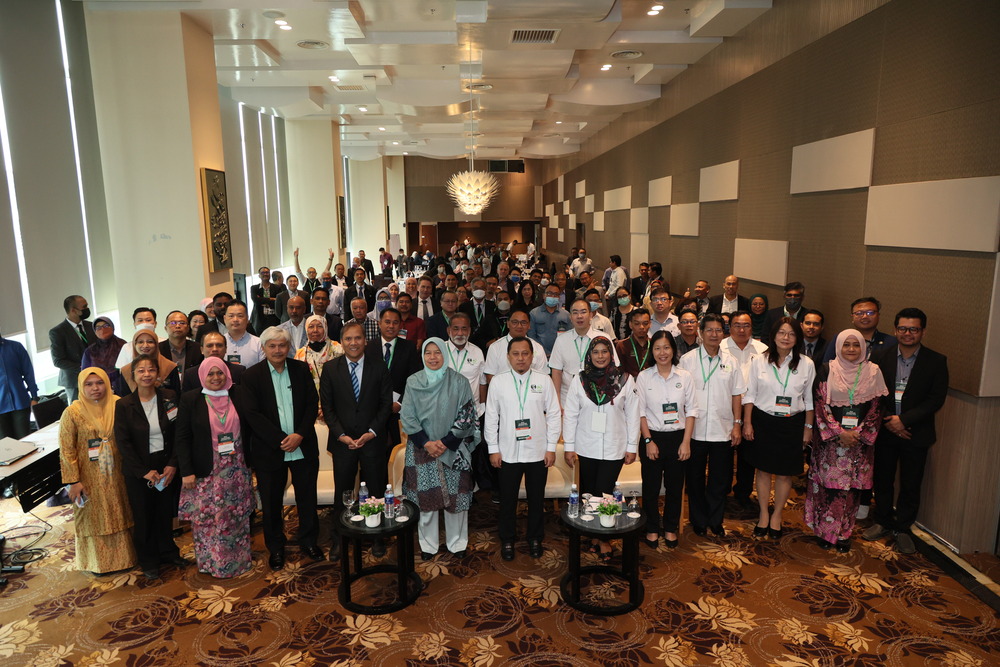
KUALA LUMPUR, 3 November 2022 – It is undeniable that certification of forest plantations and non-timber alternative sources is crucial in reducing the dependence on natural forests as a source of raw materials and ensuring the sustainability of Malaysia’s timber industry.
The requirements for the development of forest plantations have been established in various policies and action plans by the Government such as the National Agricommodity Policy 2021-2030 (DAKN 2030), Sarawak Forest Policy, Sabah Action Plan on Forest Plantation Development 2022-2036 and the Malaysia Policy on Forestry (2021). In line with the country’s commitment to sustainability goals, these policies and action plans have also set certification requirements for forest management and forest plantations.
The DAKN 2030 has placed the Malaysian Timber Certification Scheme (MTCS), implemented by the Malaysian Timber Certification Council (MTCC), as a key element for the timber sector towards achieving the aspiration of Modernising the Timber Industry Towards Increased Sustainability. Among the main targets of this sector is to achieve certification for at least 50% of the total forest area in the country (covering both natural forests and forest plantations) by 2030. It aims to reach certification for 50 Forest Management Units (FMU) and 750 companies under the MTCS forest management certification and MTCS/PEFC Chain of Custody certification, respectively.
Taking into account the various challenges that need to be addressed by the stakeholders in implementing certification of forest plantations and non-timber forest products under the MTCS, MTCC organised the MTCC Stakeholder Dialogue 2022 at Tamu Hotel & Suites Kuala Lumpur on 31 October-1 November.
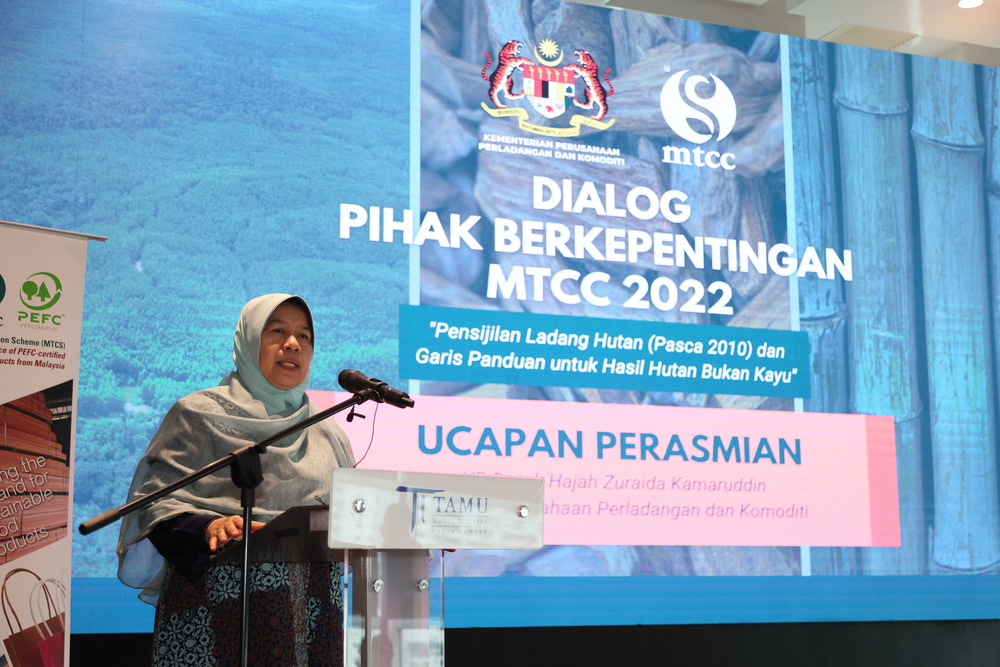
Themed Certification of Forest Plantations (Post 2010) and Guidance on Non-Timber Forest Products, the dialogue was officiated by the Minister of Plantation and Commodity Industries (MPIC), Datuk Hajah Zuraida Kamaruddin.
In her speech, Zuraida said the timber industry continues to be bullish with a positive export growth rate amidst the country’s recovery phase after facing various ramifications of the COVID-19 pandemic, which has also resulted in changed landscapes of trade and global supply chain and new business norms.
“The timber industry is one of the sectors that play a significant role in the development of the country’s economy. In 2021, the industry has contributed an export value of RM22.74 billion. From January to August 2022, the timber industry has recorded an export value of RM17.36 billion, which is an increase of 21.7% compared to the same period last year. Based on this encouraging development, DAKN 2030’s target for the export value of wood and wood products to reach RM28 billion can be achieved,” she said.
“Therefore, it is important for the industry players to regularly engage in a dialogue such as this and provide feedback or input to the ministry so that a more concerted effort to support the industry can be implemented. This is also to ensure that all of us are on the same page especially in dealing with global challenges,” said the Minister. Also present was MPIC Deputy Secretary General, Mad Zaidi Mohd Karli.
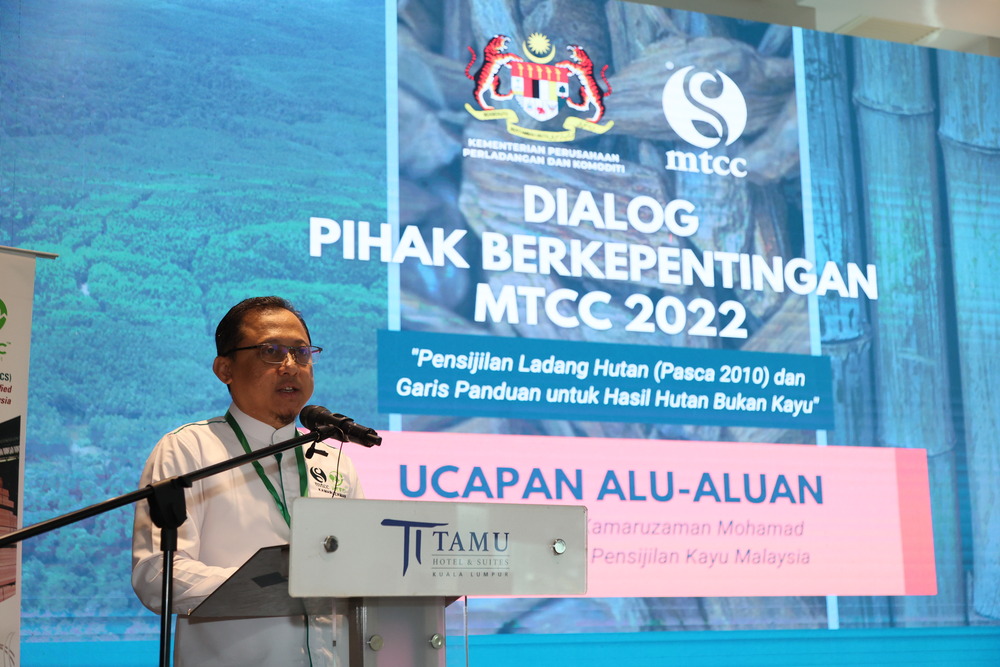
MTCC Chairman, Kamaruzaman Mohamad said the progress to obtain certification under the MTCS has been impeded by the strict requirements under Criterion 6.10 of the Malaysian Criteria and Guidelines for Sustainable Forest Management (MC&I SFM). The criterion disqualifies the certification of forest plantations established in areas converted from natural forests after the cut-off date, 31 December 2010.
“In addition to discussing issues related to the certification of forest management and forest plantations after 31 December 2010, the dialogue aims to address the increasing demand for certification of non-timber forest products such as bamboo and rubber under the MTCS. Certification for such products requires additional guidance documents to ensure that the implementation process can run smoothly.
Hence, a draft guidance document has been prepared by MTCC to provide clarity on the certification requirements of non-timber forest products under the MC&I SFM standard. This initiative is also in line with the MTCC Strategic Plan 2020-2025, in which one of its goals is to expand the scope of certification beyond timber, covering non-timber forest products and ecosystem services,” he said.
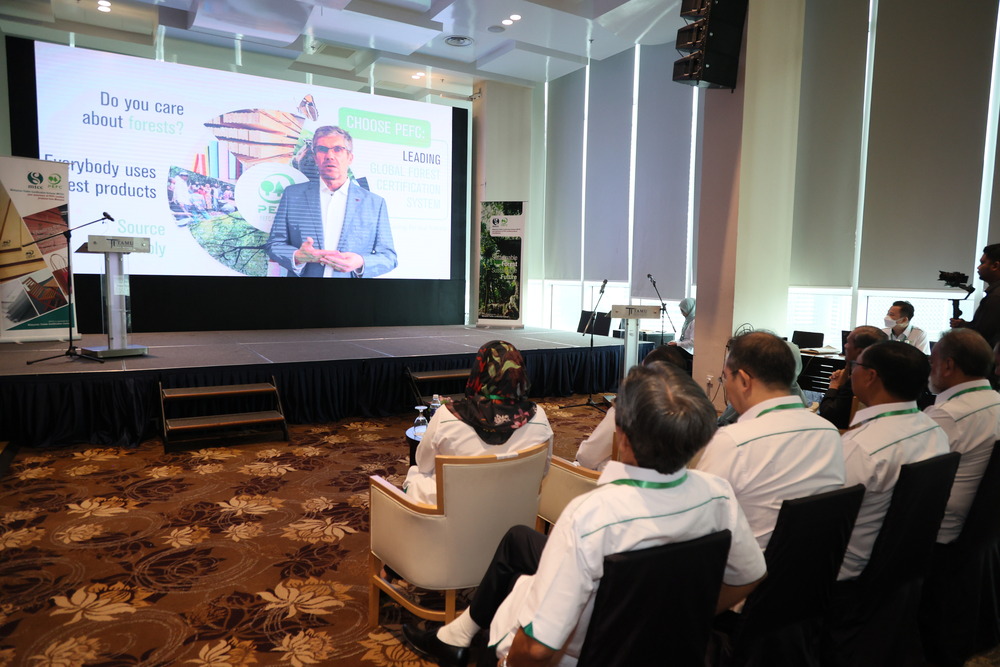
Secretary General and Chief Executive Officer of the Program for the Endorsement of Forest Certification (PEFC), Dr Michael Berger said PEFC has begun efforts to overcome the challenges being faced by various stakeholders under the MTCS, a scheme endorsed by the organisation since 2009.
“We are trying to overcome the various obstacles being faced by PEFC members in Asia such as the discriminatory issue of several countries in Europe which only accept PEFC certified wood products from Europe and not PEFC certified wood products from Asia. Another issue which is being addressed is about the cut-off date under the PEFC that cancels the eligibility to certify forest plantations established in areas converted from natural forests after 31 December 2010. This is a big issue because it involves the credibility of all parties and is detrimental to the progress of economic, social and environmental efforts in the affected forest plantations,” said Berger.
Berger said since their first discussion on this matter, PEFC and MTCC have taken one step further back in 2019. “PEFC has already discussed with MTCC to conduct a field trip to Malaysia for PEFC Working Group Committee on Sustainable Forest Management to learn about forest plantations and understand the operations further. However, what I can say is that the cut-off date should be changed by PEFC because for me it is no longer relevant due to several factors,” said Berger who delivered his keynote address virtually.
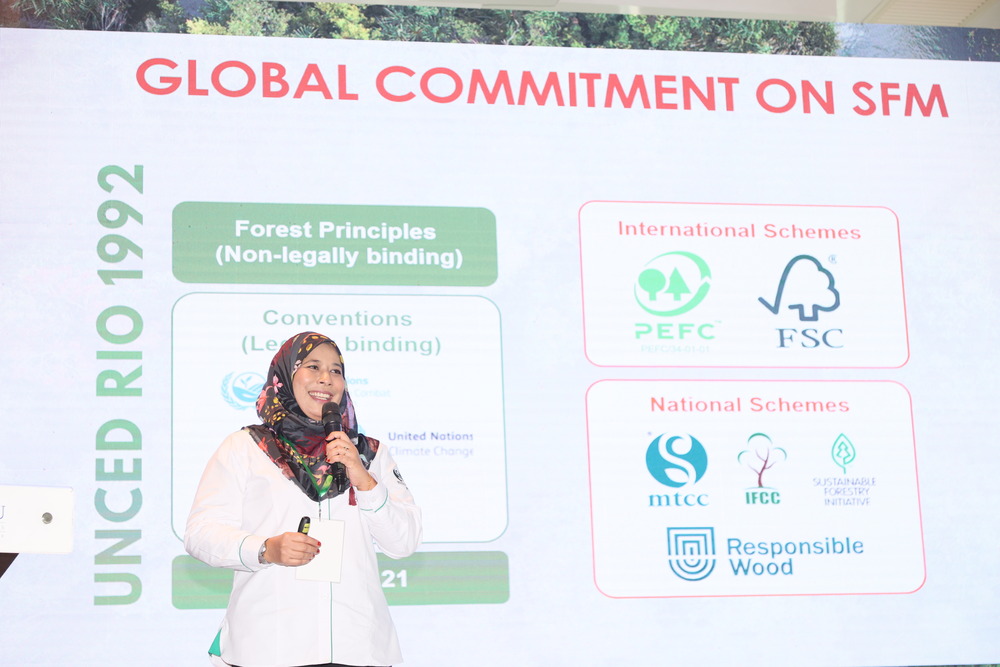
In addition to the presentation on Malaysian Timber Certification Scheme (MTCS) – Realising Global Aspirations through National Commitments by MTCC Chief Executive Officer, Siti Syaliza Mustapha, the dialogue featured 12 presentations by various organisations related to forest plantation policies and development in the three regions of Malaysia, non-timber forest products as well as mixed panel and interactive group discussions involving representatives from governmental and non-governmental groups with various interests such as environmental, social – indigenous and workers, industry as well as researchers and academician. The participants also provided feedback on the draft document, Guidelines on Application of Requirements for Non-Timber Forest Products Certification in MTCS ST 1002:2021 Malaysian Criteria and Indicators for Sustainable Forest Management under the Malaysian Timber Certification Scheme prepared by MTCC.
The event was the first to be physically organised by MTCC post Movement Control Order. It was attended by a total of 138 stakeholders who were interested or have been involved in the implementation of MTCS, representing various environmental and social interest groups, timber companies, certificate holders, timber associations, government agencies as well as research and academic institutions.
Quick Facts
- The MTCS was the first tropical forest certification scheme in the Asia Pacific region to be recognised by PEFC, the world’s largest non-governmental organisation of forest certification based in Geneva, Switzerland. MTCC is the National Governing Body for the MTCS and is responsible in facilitating the development and publication of the certification standards used under this voluntary certification scheme.
- The MTCS provides independent assessments of forest management practices and audits of manufacturers or exporters of wood products to ensure that the wood products produced or exported are obtained from sustainably managed forests, and meet the demand for certified wood products.
- Up until 15 September 2022, a total of 23 natural Forest Management Units (FMUs) and nine Forest Plantation Management Units (FPMUs) covering 5.62 million hectares have been certified under the MTCS. A total of 360 timber companies have been certified under the PEFC Chain of Custody (CoC) certificate of the scheme.
Get a peek of Day 1 and Day 2 of MTCC Stakeholder Dialogue 2022 by clicking the link below:
